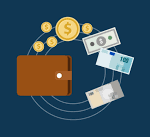What is Personal Finance?

Personal finance is a word that might sound intimidating, but it simply refers to how you manage your money. It embodies everything from earning income and budgeting expenses to saving for goals and investing for the future. Regardless of your income level, personal finance allows you to take full control of your financial well-being and achieve your individual goals.
With this article, you will be able to learn more about the world of personal finance, exploring its basic concepts and how they work together to create a roadmap for your financial success.
The Basics of Personal Finance
Personal finance is built on a foundation of five key areas:
- Budgeting and Expense Management: This is where you track your income and expenses to understand your spending habits. By creating a budget, you allocate your income towards your needs and wants, ensuring you don’t overspend. There are numerous budgeting methods, from the classic and popular 50/30/20 rule (50% needs, 30% wants, 20% savings/debt repayment) to digital budgeting apps like Kribsavup that make life easier.
- Saving and Emergency Funds: Building an emergency fund is crucial for unexpected expenses like medical bills. It’s very essential to save for medical bills because health is wealth and to keep sustaining a healthy health, we need to save for funds that will cover the expense. Examples of other Emergency funds include car repairs, urgent trip funds, and the like. Aim to save 3-6 months of living expenses to scale financial storms. Savings accounts are a safe place to store your emergency fund and other short-term goals.
- Debt Management and Repayment: Sometimes we find ourselves in debt and even though most times we might not know how we got into it, it is very essential to find our way out of it. Debt can be a place we don’t want to fall into, but it’s essential to manage it effectively. Prioritize high-interest debt like credit cards and develop a repayment plan. Strategies like the debt snowball (paying off smallest debts first) or avalanche (paying off highest-interest debts first) can help you become debt-free faster.
- Investing and Growing Your Wealth: One of the proven ways to get wealthy is investing. Investing allows your money to grow over time. Common investment options include stocks, bonds, mutual funds, and real estate. While investing involves risk, it has the potential to outpace inflation and generate long-term returns which will serve a very great purpose for us in the future.
- Financial Protection: Taking insurance is very essential to protect yourself from financial risks like illness, disability, or property damage. Different types of insurance, such as health, car, and life insurance, can safeguard your finances in case of unforeseen events. You are always at an advantage when taking insurance because it serves as a protection for your financial health.
Building Your Financial Plan
Now that you understand the basic concepts of personal finance, let’s talk about how to build a financial plan for yourself:
- Set Financial Goals: What do you want to achieve financially? Do you dream of a comfortable retirement, a child’s college education, or a vacation home? Having clear goals motivates you and helps tailor your financial strategy without mincing words.
- Track Your Income and Expenses: Understanding your cash flow is the first step. Use budgeting apps like Kribsavup or spreadsheets to categorize your income sources, such as salary and investments, and track your expenses, including rent, groceries, and entertainment.
- Create a Budget: Allocate your income towards essential expenses, debt repayment, and savings based on your financial goals and priorities. Remember, your budget should be flexible and adaptable to changing circumstances.
- Automate Your Finances: Set up automatic transfers to savings and investment accounts. Automating these processes ensures consistent progress toward your goals and reduces the risk of impulsive spending.
- Reduce Debt and Manage Credit: Prioritize paying off high-interest debt. Develop a debt repayment strategy and stick to it. Pay your bills on time to maintain a good credit score, which unlocks better loan rates in the future.
- Invest for the Long Term: Start investing early, even with small amounts. Research different investment options that align with your risk tolerance and financial goals. Consider seeking professional financial advice for complex investment decisions.
- Protect Your Assets: Secure adequate insurance coverage to safeguard your finances from emergencies. Re-evaluate your insurance needs as your life circumstances evolve to know which type of insurance you need exactly.
- Review and Revise: Personal finance is a journey, not a destination. Regularly review your budget, financial goals, and investment strategy. Adapt your plan as your income, expenses, and life goals change.
Financial Resources and Education.
Equipping yourself with knowledge is key to successful personal finance management. Numerous resources are available to help you on your journey:
- Books and Online Articles: A wealth of information exists on personal finance. Explore books and articles by reputable financial experts to gain insights and strategies.
- Financial Calculators: Use online financial calculators to estimate future investment returns, and retirement plans, or compare loan options.
- Financial Apps: Budgeting apps like Kribsavup, investment platforms, and expense trackers help simplify personal finance tasks and make managing your money more convenient.
- Financial Advisors: For complex financial situations, consider seeking guidance from a certified financial planner (CFP®) to gain more clarity.
Personal Finance Is a Lifelong Journey.
Taking control of your finances is a journey filled with learning, adapting, sometimes trials and errors, and also achieving milestones. Remember, there’s no one-size-fits-all approach.
Personal finance is about creating a customized plan that works for you and your unique circumstances. Don’t be discouraged by setbacks; view them as a golden learning opportunity to even do better. Celebrate your achievements, big and small, to stay motivated.
If you consistently apply these strategies and stay up to date with the necessary information you need to thrive in your financial health, you’ll gain financial confidence and save; your financial journey with clarity and purpose.
Always remember, personal finance isn’t just a term. It’s about taking charge of your financial future and building the life you desire.





